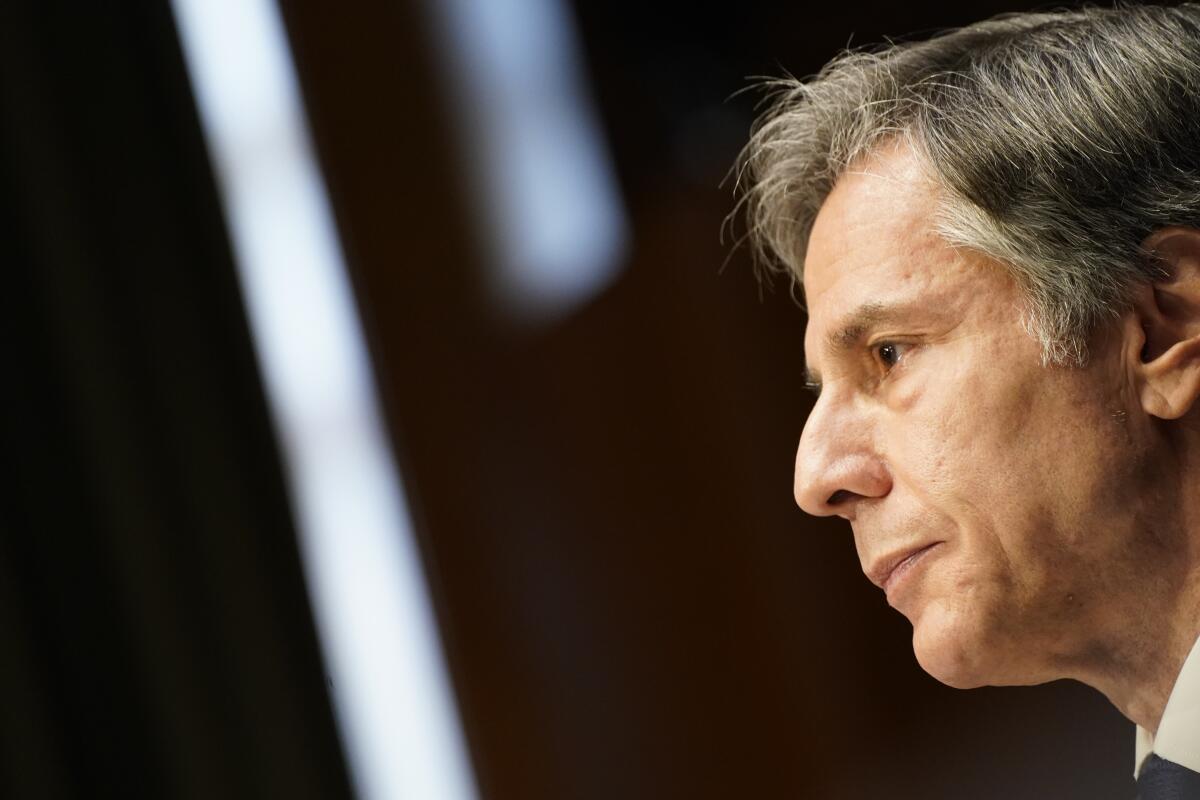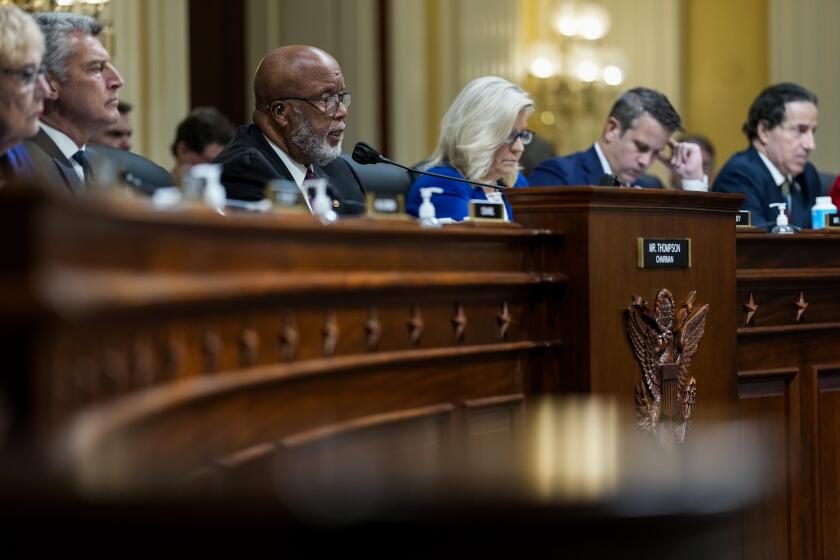Saudis angrily say U.S. oil accusations are political, unfounded

- Share via
BEIRUT — The spat between the United States and Saudi Arabia and its fellow OPEC members over the management of petroleum supplies intensified Thursday when Riyadh accused Washington of “politicizing oil” and declared it would not submit to “dictates” from supposedly friendly countries.
The Biden administration, in turn, said it was reassessing its relationship with the desert kingdom, a longtime if often problematic ally, after its “shortsighted” decision on oil production.
President Biden is under mounting pressure from Congress and others to take forceful steps against Saudi Arabia — including possible suspension of weapons sales — after it and Russia successfully pushed a move to reduce the production of oil by 2 million barrels a day, virtually guaranteeing higher revenue for Moscow that will help finance its war against Ukraine.
This comes three months after Biden traveled controversially to Saudi Arabia to plead for cooperation in supplying enough oil to meet demand as prices at the pump in the U.S. soared.
Former President Trump is likely to fight the subpoena in court. With the committee set to disband at year’s end, it has little chance of questioning the ex-president.
Secretary of State Antony J. Blinken said Saudis have repeatedly indicated they wanted to reduce oil production, even though they knew it would benefit Russia and hurt Ukraine by weakening sanctions that the U.S. and Western powers have enacted against Moscow.
“We made clear that that would be the wrong direction,” Blinken told reporters in a news conference at the State Department in Washington.
“The recovery is fragile,” Blinken said. “We’re dealing with head winds from COVID. We’re also dealing with head winds from the Russian aggression itself. And so, now is not the time to take energy off the market.”
Saudi Arabian officials, meanwhile, are waging an all-out media counteroffensive. After several appearances of officials on U.S. television, a stern statement from the Saudi Foreign Ministry was released Thursday. It quoted an unnamed spokesperson saying the government expressed “its total rejection” of accusations that it was taking sides in international conflicts or that its decision was aimed at the U.S., as Washington has claimed.
“The Kingdom affirms that outcomes of the OPEC+ meetings are adopted through consensus among member states, and that they are not based on the unilateral decision by a single country,” the statement said, adding that the outcomes were based purely on economic considerations, that its relationship with the U.S. was a strategic one based on mutual interest and that attempts to distort its position on Ukraine were unfortunate.
(Saudi Arabia voted against Russia’s annexation of Ukrainian regions in a U.N. General Assembly meeting Wednesday.)
The statement said the Biden administration had requested postponing the group’s decision on the cuts for one month, presumably so as to avoid any fallout on fuel prices that would then affect Democrats’ chances in early November midterm elections. But such a delay would have had “negative consequences,” the statement said.
Asked about the delay request, Blinken said the administration asked OPEC wait until its next meeting, in November, to assess how market prices were faring after the summer spikes.
Earlier in the year, supply shortages as a result of the war in Ukraine had pushed oil prices to $120 per barrel. But they have been falling since June, with Saudi officials raising alarm when the price hovered around $85 amid fears that the downward trend would persist, said Ziad Daoud, chief emerging markets economist with Bloomberg.
The U.S. would like to see the market flooded with oil, in cooperation with Persian Gulf producers, to cause difficulties for Russia, as occurred during the 1979 Soviet invasion of Afghanistan, said Rami Khalifah Ali, a Paris-based political analyst specializing in Saudi Arabia and the gulf.
“The decision from the gulf was to take a neutral stance between the U.S. and Russia,” Ali said. “That’s because now their priorities are their own economic considerations, especially when it comes to the U.S. facing Russia.”
Officials also took pains to tout OPEC+ as a stabilizing force in energy markets. Speaking to the Saudi state-run news channel Al Arabiya on Tuesday, Saudi Foreign Minister Prince Faisal bin Farhan said oil markets had shown far less volatility than those for gas, for example, which have recently witnessed significant price increases.
But beyond the economics, the growing diplomatic fracas — along with vows of reprisals from Democratic congressional leaders— has aggravated a long-smoldering rift between Washington and Riyadh even as it speaks to a wider shift in the relationship between the two allies, analysts say.
“This has been going on since the beginning of the Biden administration. It was never repaired, and I think unfortunately the language the Biden administration is using — it just debases the relationship and makes it harder to rebuild,” said Karen Young, a gulf-focused senior research fellow at Columbia University’s Center on Global Energy Policy.
That could have consequences with the region heading toward economically turbulent times, when the U.S. would usually look to richer allies in the Middle East — especially the United Arab Emirates and Saudi Arabia — to deploy their coffers in the service of maintaining regional stability.
“We need to have the Emirates and Saudi Arabia to invest there, to give fiscal support, so we’ve kind of shot ourselves in the foot, whatever happens in the region,” she said.
“The Saudis are asking for what they’ve been asking for since 2016, which is respect. That’s the language they use in the statement.”
The last blowup between the U.S. and Saudi Arabia was over the U.S. intelligence conclusion that Crown Prince Mohammed bin Salman ordered the murder of U.S.-based Saudi journalist Jamal Khashoggi,
Threats of paring U.S. support to Saudi Arabia come at a delicate time. Since 2015, the kingdom has relied on Washington’s help in pursuing its war against the Houthis, Iranian-backed rebels who control large swaths of northern neighbor Yemen, including the capital, Sana. A cease-fire with the group came to an end this month.
Blinken, however, made it clear that new calculations are being made within the Biden administration, although he continued to use the word “recalibrate” to refer to assessment of the relationship, instead of saying there was a rupture.
“We have a multiplicity of interests with Saudi Arabia, and our policies need to reflect that,” Blinken said. “We need to recalibrate the relationship with Saudi Arabia ... and that process is now continuing with one goal in mind, to make sure that the relationship ... more effectively addresses and advances our interests.”
Staff reporters Bulos reported from Beirut and Wilkinson from Washington.
More to Read
Get the L.A. Times Politics newsletter
Deeply reported insights into legislation, politics and policy from Sacramento, Washington and beyond. In your inbox twice per week.
You may occasionally receive promotional content from the Los Angeles Times.













